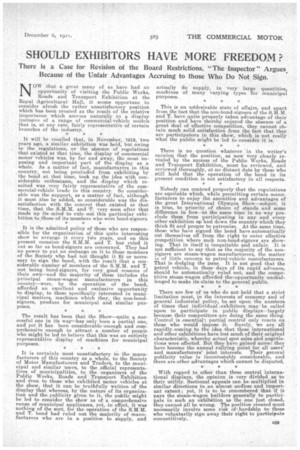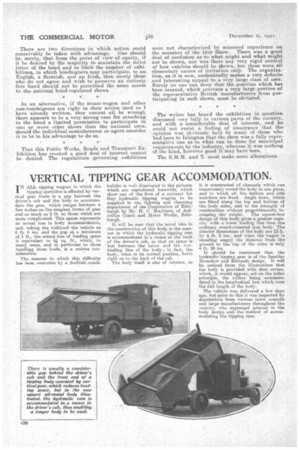SHOULD EXHIBITORS HAVE MORE FREEDOM?
Page 25

Page 26

If you've noticed an error in this article please click here to report it so we can fix it.
There is a Case for Revision of the Board Restrictions, "The Inspector " Argues. Because of the Unfair Advantages Accruing to those Who Do Not Sign.
NOW that a great many of us have had an opportunity of visiting the Public Works, Roads and Transport Exhibition at the Royal Agricultural Hall, it seems opportune to consider afresh the rather unsatisfactory position whichhas been created as the result of the relative importance which accrues naturally to a display inclusive of a range of commercial-vehicle models that is, at any rate, fairly representative of certain
branches of the industry. .
It will be recalled that, in November, 1919, two years ago, a similar exhibition was held, but owing to the regulations, or the absence of regulations that existed at that time, the display of commercial motor vehicles was, by far and away, the most imposing and important part of the display as a whole. As a matter of fact, manufacturers in this country, not being precluded from exhibiting by ' the bond at, that time, took up the idea with considerable enthusiasm, and the display which resulted was very fairly representative of the commercial-vehicle trade in this country. So considerable was the support, as a matter of fact, although it must also be added, so considerable was the dissatisfaction with the control that existed at that time that the S.M.M. and T. very soon after that made up its mind to rule out this particular exhibition to those of its members who were bond-signers.
It is the admitted policy of those who are responsible for the organization of this quite interesting show to arrange it every to years, and on this present occasion the S.M.M. and T. has ruled it out so far as bond-signers are concerned. They had no power to put an embargo on it to those members of the Society who had not thought it fit or necessary to sign the bond, with the result that a considerable number of members of the S.M.M. and T. not being bond-signers, for very good reasons of their own—and the majority of these includes the • principal steam-wagon manufacturers in this country—were, by the operation of the bond, afforded an excellent and exclusive opportunity to display, to those specifically interested in municipal matters, machines which they, the non-bondsigners, produce for municipal and similar purposes.
The result has been that the Show—quite a successful one in its way—has only been a partial one, and yet it has been considerable enough and comprehensive enough to attract a number of people who might be led to believe that this was an entirely representitive display of machines for municipal purposes.
It is certainly most unsatisfactory to the manufacturers of this country as a whole, to the Society of Motor Manufacturers and Traders, to the municipal and similar users, to the official representatives of municipalities, to the organizers of the Public Works, Roads and Transport Exhibition and even to those who exhibited motor vehicles at the show, that it can be truthfully written of the display that whereas, by the nature of its organization and the, publicity given to it, the public might be led to consider the show as of a comprehensive range of municipal appliances, yet, in effect, it was nothing of the sort, for the operation of the S.M.M. and T. bond had ruled out the majority of manufacturers who are in a position to supply, and actually do supply, in very large quantities, machines of many varying types for municipal purposes.
This is an uridesirable state of affairs, and apart from the fact that the non-bond-signers of the S.M.M. and T. have quite properly taken advantage of their position and have thereby enjoyed the absence of a great deal of effective competition, they cannot obtain much solid satisfaction from the fact that they are participators in this show, which is not really what the public might be led to consider, it is.
There is no question whatever in the writer's• opinion that the position, as now very clearly revealed by the success of the Public Works, Roads and Transport Exhibition, must be reviewed, and reviewed thoroughly, at no distant date by those who still hold that the operation of the bond in its present condition is not satisfactory in all respects.
Nobody can contend properly that the regulations arc equitable which, while permitting certain manufacturers to enjoy the amenities and advantages of the great International Olympia Show—subject, it is true, to priority of choice of stands arid some difference in fees—at the same time in no way preclude them from participating in any and every other exhibition up and down the country which they think fit and proper to patronize. At the same time, those who have signed the bond have automatically cut themselves off from the right to enter effective competition where such non-bond-signers are showing. That in itself is inequitable and unfair. It is not sufficient to say that as the majority of the nonsigners are steam-wagon manufacturers, the matter is of little concern to petrol-vehicle manufacturers. That is dodging the issue. It is not good that the petrol vehicle in these days of its rapid advance, should be automatically ruled out, and the competitive steam-wagon afforded the-opportunity unchallenged to make its claim to the general public.
There are few of us who do not hold that a strict limitation must, in the interests of economy and of general industnial policy, be set upon the numbers of times that individual exhibitors may be called upon to participate in public displays—largely because their competitors are doing the same thing. Control is essential.; partial control only reacts on those who would impose it. Surely, we are all international and coming to the idea that these and other exhibitions have lost much of their original characteristic, whereby actual spot sales and negotiations were effected. But they have gained more: they have become the annual rallying point for all users' and manufacturers' joint interests. Their general publicity value is incontestably considerable, and there are other advantages which cannot be disputed, With regard to other than these central international displays, the opinion is very divided as to their utility. Sectional appeals can be multiplied in similar directions to an almost endless and important extent ; yet, it is to be remembered that if it pays the steam-wagon builders generally to participate in such an exhibition as the one just closed, they cannot all be wrong. The position created must necessarily involve some risk of hardship to those who voluntarily sign away their right to participate competitively. There are two directions in which action could conceivably he taken with advantage. One should be, surely, that from the point of view of equity, if it be desired by the majority to maintain the strict letter of the bond and to limit the number of exhibitions, in which bondsigners may participate, to an English, a Scottish, and an Irish, then surely those who do not agree and wish to preserve an entirely , free hand should not be permitted the same access to the national bond-regulated shows.
As an alternative, if the steam-wagon and other non-hondsigners are right in their action (and as I have already written, they cannot all be wrong), there appears to be a very strong case for attaching to the bond a limited permission to participate in one or more other shows than the national ones, should the individual manufacturer or agent consider it to be to his advantage to do so.
That this Public Works, Roads and Transport Exhibition has created a good deal of interest cannot be denied. The regulations governing ex.hileitors were not characterized by seasoned experience on the .occasion of the 19la Show. There was a good deal of confusion as to what might and what might • not be shown, nor was there any very rigid control of how exhibits should be shown, but these were all elementary causes of irritation only. The organization, as it is now, undoubtedly makes a very definite and interesting appeal to a very large class of user. Surely no one can deny that the position which has been created, which prevents a very large portion of the representative British manufacturers from participating in such shows, must be obviated.
The writer has heard the exhibition in question discussed very fully in various parts of the country, and with a considerable deal of interest, and he could not resist a feeling of annoyance that the • opinion was obviously held by many of those who had been to Islington that the show was a fully representative one as' to what can be done for municipal requirements by the industry, whereas it was nothing of the kind, however goad it may have been.
The S.M.M. and T. must make some alterations.
































